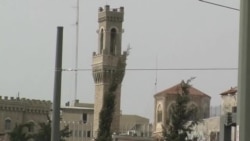JERUSALEM —
President Barack Obama's trip to the Middle East next week (March 20-22) is generating interest in Israel and the Palestinian territories because, as president, he has never visited them. Still, expectations are low that the trip will bring any changes to the dormant Mideast peace process that is a source of frustration for both peoples.
In Arab East Jerusalem, Mohamed Abu Ghadan operates this parking lot owned by his family for 70 years. He is looking forward to President Obama's visit. But like many people here, he says he does not expect a breakthrough in the stalled peace talks.
"In my opinion this is just a waste of time. It's not for the benefit of the Palestinian cause. It for the benefit of our cousins [the Jews]," he said.
Obama is to meet with political leaders in Israel and the occupied West Bank. But photographer Mahfouz Abu Turk says Palestinians believe the U.S. government has favored Israel so much that it can no longer be a mediator.
"I don't think the visit of Obama will do anything for the Palestinian people because until now he has shown that he doesn't have the political will to make dramatic changes in the region," he said. "We are not on Obama's agenda at least right now," he said.
Palestinians are asking if a U.S.-backed two-state solution is still possible, with a Palestinian state and Israel co-existing peacefully.
"If you can answer this question, Mr. Obama, of course, you are very much needed here. Of course, your influence is very important and, of course, let's look for practical steps to reach that goal. If not let's be creative enough to think differently," said Mahdi Abdul Hadi, who heads a Palestinian research group in East Jerusalem.
A kilometer away in Jewish West Jerusalem, Israelis express the same despair.
"I don't think there will be a big change because this region is so complicated and so full of problems that it can be changed," said homemaker Jacqueline Dewek.
Tensions over Iran's nuclear program, the political upheavals in Arab countries, and Syria's civil war will figure in the trip, says Israeli analyst Danny Rubinstein. But Obama's three-day focus on Israel and the Palestinian territories shows he wants to be involved in the peace process.
"My hope is that he will talk with us and with the Palestinians about how to renew the peace process and not only renew it. We don't need the peace process for the process. We need it to solve the problem," said Rubinstein.
Daniel Madmon agrees. He recently finished his mandatory service in the Israeli army.
"Obama, I think, will find Israel is much more prepared for peace than he thinks," he said.
His message to the U.S. president: bring us peace.
In Arab East Jerusalem, Mohamed Abu Ghadan operates this parking lot owned by his family for 70 years. He is looking forward to President Obama's visit. But like many people here, he says he does not expect a breakthrough in the stalled peace talks.
"In my opinion this is just a waste of time. It's not for the benefit of the Palestinian cause. It for the benefit of our cousins [the Jews]," he said.
Obama is to meet with political leaders in Israel and the occupied West Bank. But photographer Mahfouz Abu Turk says Palestinians believe the U.S. government has favored Israel so much that it can no longer be a mediator.
"I don't think the visit of Obama will do anything for the Palestinian people because until now he has shown that he doesn't have the political will to make dramatic changes in the region," he said. "We are not on Obama's agenda at least right now," he said.
Palestinians are asking if a U.S.-backed two-state solution is still possible, with a Palestinian state and Israel co-existing peacefully.
"If you can answer this question, Mr. Obama, of course, you are very much needed here. Of course, your influence is very important and, of course, let's look for practical steps to reach that goal. If not let's be creative enough to think differently," said Mahdi Abdul Hadi, who heads a Palestinian research group in East Jerusalem.
A kilometer away in Jewish West Jerusalem, Israelis express the same despair.
"I don't think there will be a big change because this region is so complicated and so full of problems that it can be changed," said homemaker Jacqueline Dewek.
Tensions over Iran's nuclear program, the political upheavals in Arab countries, and Syria's civil war will figure in the trip, says Israeli analyst Danny Rubinstein. But Obama's three-day focus on Israel and the Palestinian territories shows he wants to be involved in the peace process.
"My hope is that he will talk with us and with the Palestinians about how to renew the peace process and not only renew it. We don't need the peace process for the process. We need it to solve the problem," said Rubinstein.
Daniel Madmon agrees. He recently finished his mandatory service in the Israeli army.
"Obama, I think, will find Israel is much more prepared for peace than he thinks," he said.
His message to the U.S. president: bring us peace.





